Woolies, Coles to limit customers in stores as experts reveal how to shop safely during COVID-19 pandemic
Supermarket giants Woolworths and Coles will introduce strict new customer limits in stores, in a bid to enforce social distancing measures during COVID-19.
Coronavirus
Don't miss out on the headlines from Coronavirus. Followed categories will be added to My News.
Woolworths and Coles will introduce strict new customer limits in stores, in a bid to enforce further social distancing measures during COVID-19.
The new customer headcounts at both Australian supermarket giants will apply from Monday, with the number of shoppers allowed inside the stores at any one time depending on each store’s floor space.
Customers may be counted at the door and asked to queue on the street, and only allowed in as other shoppers leave, following similar measures introduced in the UK.
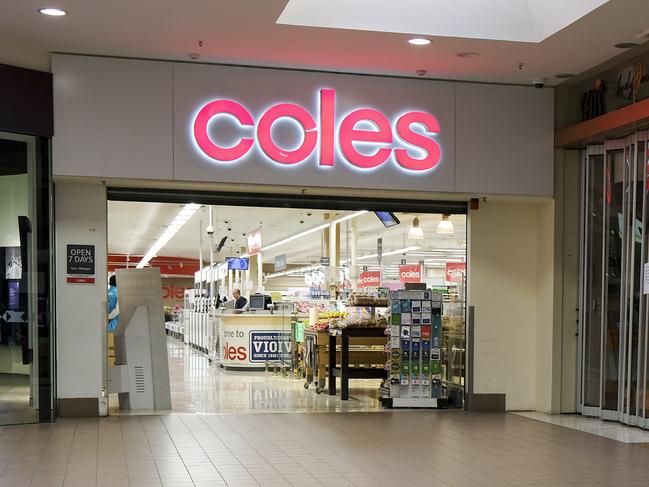
Coles chief operating officer Matt Swindells said from Monday, the supermarket would be “restricting the number of customers that can enter a store should we get to a volume that is too great for us to maintain” a safe distance.
It also announced extended trading hours from 7am-10pm, and 7am-midnight in selected Coles stores, according to an email sent to customers today. “Late evenings are typically less busy, so please consider visiting at this time if you prefer a quieter shopping period,” Coles said in its message to shoppers.
In a statement, Woolworths added: “Customers will start to notice stores implementing new social distancing measures in the lead-up to the Easter weekend”.
“Depending on how busy a store is, we may limit the number of people entering the store from time to time,” the Woolies statement said.
“Customer limits will be specific to each location and based on the size of the store.
“Our store managers will use common sense discretion to manage this in the interest of community safety.”
SUPERMARKET PROTOCOL
Heading to the supermarket right now can seem like a daunting task.
They’re full of people and surfaces, any of which could be carrying the deadly coronavirus.
But there’s no need to be fearful, according to health experts, who have debunked common myths and revealed how to shop safely and sensibly as the COVID-19 pandemic rolls on.
Here’s what they had to say:
HOW LONG SHOULD I SPEND IN THE SUPERMARKET?
Simply put, as little time as possible.
This is because the biggest risk in supermarkets is coming into contact with someone that is infected with COVID-19, Curtin University’s Pro Vice-Chancellor Archie Clements said.
However, it is important to remember that Australia does not have widespread community transmission of the coronavirus.
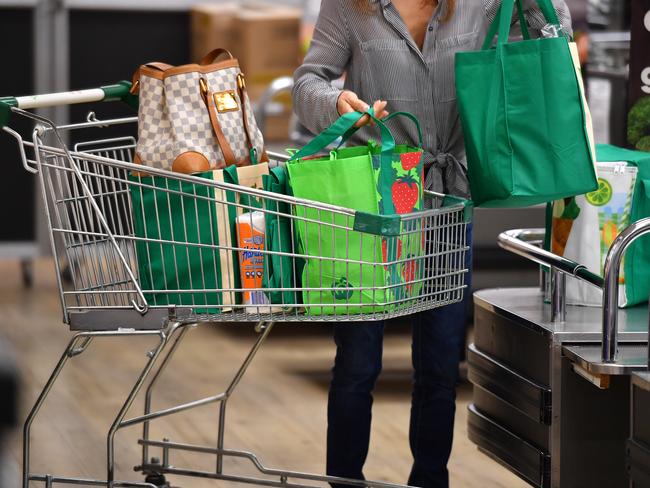
“The sensible thing to do is to go in, go shopping and get out,” Prof Clements said. “And not to linger in the aisles.”
Associate Professor Michael Beard of the University of Adelaide’s Research Centre for Infectious Diseases said Australian’s shouldn’t be going to the shops every day.
“It’s all about trying to minimise the risk of getting infected,” he said.
Associate Prof Beard said Australians could do this by planning ahead, such as writing a shopping list, before going to the store.
I’VE SEEN PEOPLE WEARING FACE MASKS AND GLOVES WHILE SHOPPING. SHOULD I DO THE SAME?
Experts said this was unnecessary, especially face masks which should be saved for healthcare workers on Australia’s COVID-19 frontline.
“You should only really be wearing a face mask to protect people in proximity to you if you have the virus,” Associate Prof Beard said. “And if you are sick with the coronavirus, you shouldn’t be out shopping.”
Face masks are designed to prevent airborne droplets from landing on surfaces if an infected person coughs or sneezes. They can also protect against infection if they are worn properly (over the nose and mouth) by preventing people from touching their face after touching a contaminated surface.
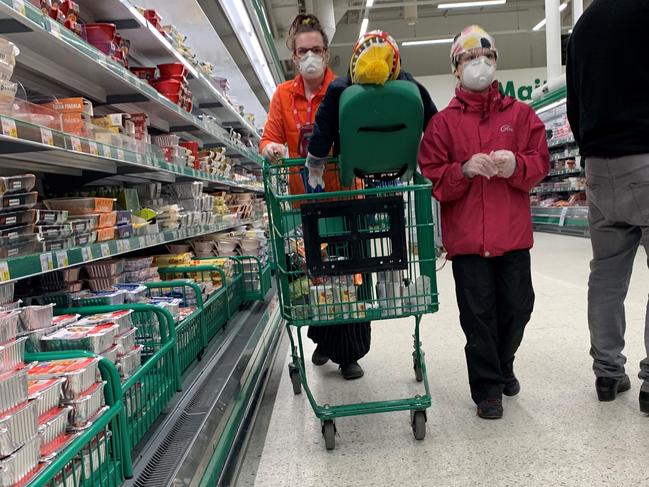
Associate Professor Deb Friedman, a senior lecturer at Deakin University and infectious disease consultant at Barwon Health, said widespread wearing of gloves was not recommended.
“When you wear gloves the become contaminated with loads of different things in your environment. And when people remove them they tend to contaminate themselves,” Associate Professor Friedman said.
SO WHAT SHOULD I BE DOING INSTEAD?
Experts agreed that common sense approaches were most effective.
These include practising social distancing measures, proper and regular hand hygiene and wiping down high-contact surfaces with disinfectant wipes.
Coles and Woolworths have ramped-up their in-store hygiene measures and are regularly cleaning basket and trolley handles. They have also provided disinfectant wipes in case customers would like to do it themselves.
Prof Clements said if it gave customers peace of mind, they could also carry their own disinfectant wipes to do it themselves.
Associate Prof Beard said shoppers should carry an alcohol-based hand sanitiser with them – particularly if they were planning to be out for some time – and regularly clean their hands.
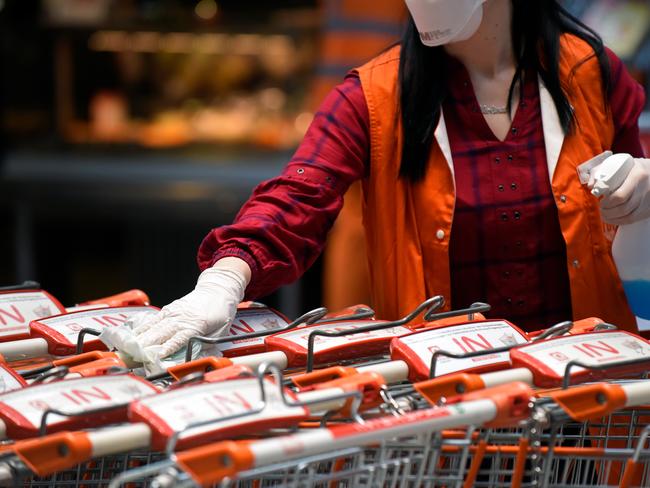
SHOULD I BE USING SELF-SERVE CHECK-OUTS AND PAYING WITH CASH?
Associate Prof Friedman said anything that reduced face-to-face contact in close confines such as supermarkets was advantageous.
She said it was “quite reasonable” for card payments to be preferred over cash, but said even then the risk of cash carrying the virus was very low.
“I think that the reason for it is actually more about hand-to-hand contact than contact with the money,” she said.
“I think that there would be a very small risk of acquiring infection from transfer of money.”
If shoppers washed or sanitised their hands after handling money it would eliminate the risk, she said.
I’VE HEARD ABOUT THE VIRUS LINGERING ON CERTAIN SURFACES. SHOULD I BE CLEANING MY SUPERMARKET PURCHASES?
The New England Journal of Medicine recently published a study that found COVID-19 was detectable on copper for up to four hours, on cardboard for up to 24 hours, and on plastic and steel for up to 72 hours.
However, the virus rapidly decreased on all of those surfaces over time.
Dr Beard said it was important to remember that these studies were done in controlled laboratory conditions, and variations in factors including heat and light all impacted how long the virus could survive.
Prof Clements said people should always wash their fruit and vegetables, but did not believe further measures were necessary.
“I don’t think there should be any additional cleansing decontamination of things that people buy in the shops,” he said.
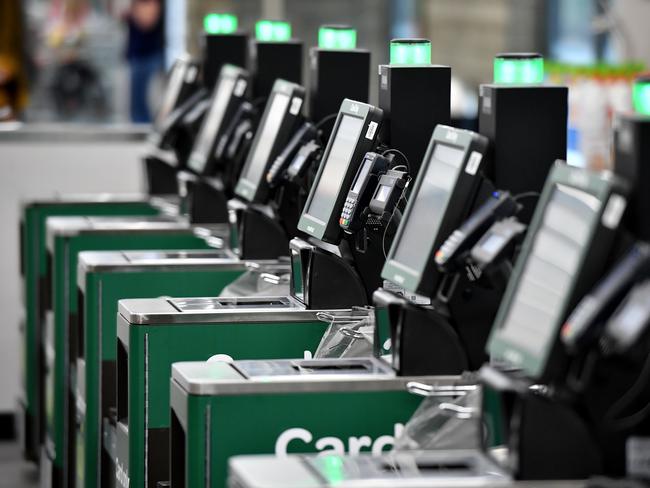
He said items like fruit, vegetables and clothing had porous surfaces which did not provide ideal conditions for the virus to survive, and made it less likely for the virus to come into contact with someone’s skin.
“It’s more surfaces like railings and door handles that people should be thinking about,” he said.
“And even then, people should really just be thinking about sanitising their hands regularly.”
Associate Prof Friedman said that while studies might show how long the virus can last on certain surfaces, they did not show whether transmission from them was possible and this was yet to be proven.
She said the most practical things people could do was, where possible, throw product packaging out once home and then wash your hands.
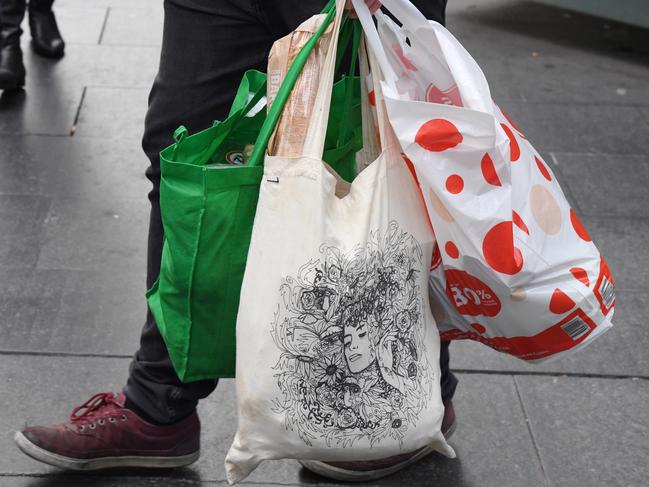
SHOULD I BE CLEANING MY REUSABLE BAGS?
Associate Prof Friedman said this was unnecessary.
“If you put your reusable plastic bags into a cupboard for a few days, then the virus would be dead anyway,” she said.
“If you’re planning on reusing it straight away, you could try to disinfect the bag, but that’s going to be very labour intensive and not particularly advantageous.”
She said cloth tote bags were another option as you could wash them for peace of mind, but it was “very unlikely” they would harbour infection due to the porous material.
WHAT MEASURES ARE THE SUPERMARKETS TAKING?
Coles and Woolworths have ramped-up the in store hygiene measures in order to prevent the spread of the coronavirus.
Social distancing markers and reminders have been rolled out in both supermarkets, and both are encouraging shoppers to keep a trolley-length apart from others in the store.
Coles says it has increased in-store cleaning for high contact areas such as trolley and basket handles, and is providing disinfectant wipes for customers to wipe these same surfaces down if they wish.
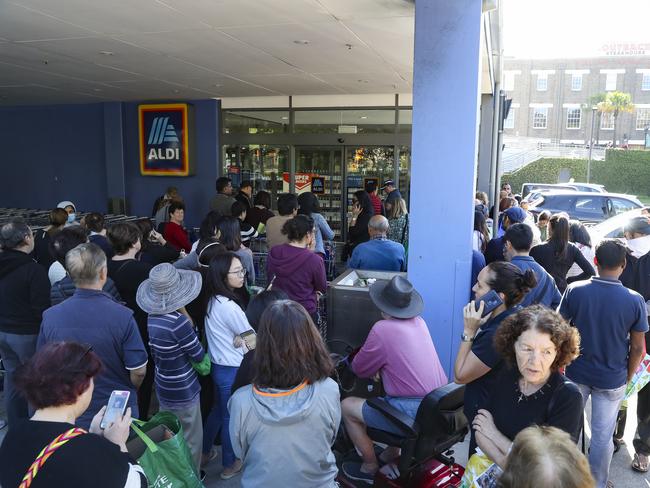
Woolworths has done the same, and is rolling out plexiglas screens to create a barrier between shoppers and checkout workers. Staff at the registers are also being rotated every two hours to minimise face-to-face interactions.
Both are requesting shoppers pay by card and are asking them to pack their own bags.
At Aldi, 1.5-metre social distancing markers have been introduced at stores and security guards are stationed to control the number of customers in store.
Australia’s third largest supermarket is also rolling out clear glass screens at registers and encouraging card payments.
All employees have access to gloves, masks and hand sanitiser.
WHAT SHOULD I DO IF I’M A SENIOR OR NEED EXTRA ASSISTANCE?
The Federal Government has urged Australian aged 70 and above to stay home with the exception of going outside for fresh air and exercise.
However, Both Coles and Woolworths have introduced dedicated community hours for the elderly and those in need of assistance.
Coles’ community hour runs from 7am to 8am on Monday, Wednesday and Friday, and is open to elderly customers, those in need of assistance, as well as carers, friends and neighbours who are shopping on behalf of vulnerable Australians.
The will need to show one of the following Government-issued ID cards: Pensioner Concession Card, Companion Card, Commonwealth Seniors Health Card, Health Care Card, Seniors Card, or Disability Card.
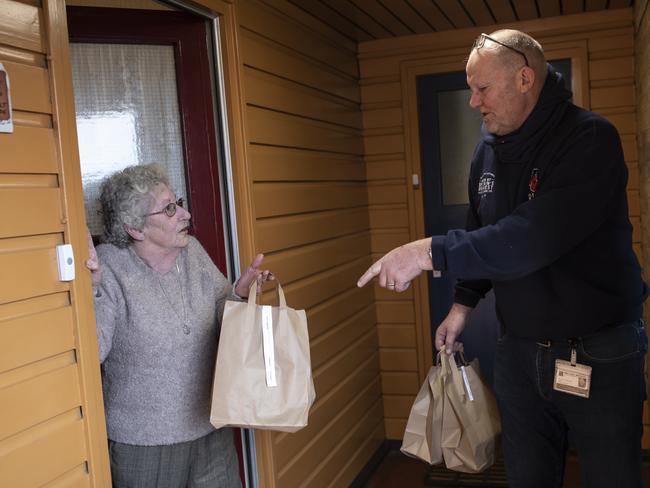
Carers, friends or neighbours will need to show the relevant card for the person they are shopping on behalf of.
Woolworths community hour runs on the same days at the same time for the elderly and people with a disability.
They are required to present one of the aforementioned Government-issued ID cards.
Associate Prof Beard said he believe senior Australians should not be going out shopping at all unless absolutely necessary.
“Either get your groceries delivered, or get someone to do the shopping for you,” Associate Prof Beard said.
WHAT IF I WANT TO AVOID THE STORE? ARE SUPERMARKETS STILL DELIVERING GROCERIES?
Coles and Woolworths are both prioritising elderly and vulnerable Australians for delivery orders.
Chief Operations Officer at Coles Matthew Swindells said the supermarket was focused on restocking the supply chain so that online orders could be fulfilled, but online orders for the most vulnerable community members were being prioritised.
“This week, we launched the Coles Online Priority Service (COPS) for vulnerable customers. We already have 60,000 active customers, and we aim to roll the service out more broadly in coming days,” he said.
You can register for Coles’ COPS program here.
Woolworths is also focused on delivering groceries to vulnerable customers through its Priority Assistance program, which you can register for here.
The shift in focus means delivery has been “temporarily suspended” in select locations”
IGA has also launched its first home delivery service to help older and vulnerable customers.
The new IGA priority shop announced today has been rolled out to help support customers including the elderly and vulnerable across its 1400 stores.
It means people who are unable to leave their home are still able to get essential grocery packs delivered to their front doors.
You can register here or call 1800 018 384.
However, ordinary shoppers can still access other grocery delivery services.
In Melbourne, Your Grocer delivers to the metropolitan area, and same day delivery is possible if an order is placed before 11am.
Sydneysiders have access to Harris Farm. Delivery times vary depending on what zone you live in, and you can find out more here.
Originally published as Woolies, Coles to limit customers in stores as experts reveal how to shop safely during COVID-19 pandemic


